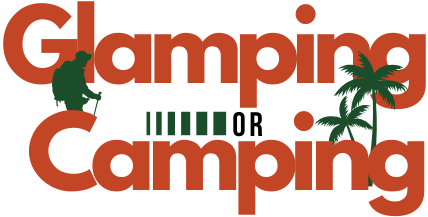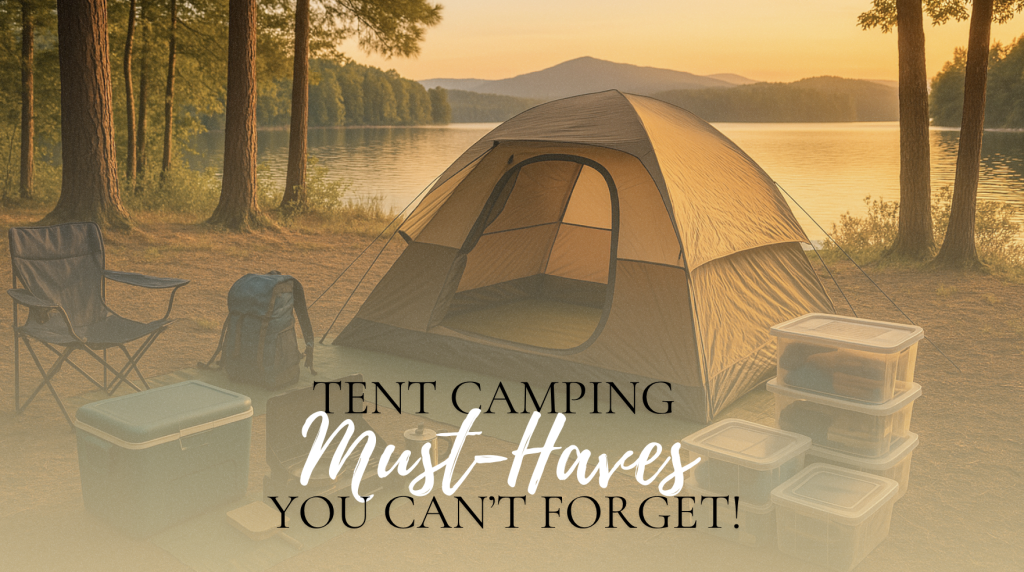Ready for your next outdoor adventure? Tent camping connects you to nature like nothing else—stars overhead, fresh air all around, and no walls between you and the wild.
But the freedom of camping comes with one challenge: knowing what to pack! First-timers often bring too much or forget essentials, while even seasoned campers can miss crucial items.
We’ve created the ultimate tent camping packing list that covers everything from basic shelter to little comforts that make roughing it not so rough.
Our practical checklist takes the guesswork out of packing, so you can focus on what matters—making amazing memories under the open sky.
Must-Have Items for Tent Camping
Getting ready for your outdoor getaway? Packing for tent camping doesn’t have to be hard! The following sections will help you know exactly what to bring so you can focus on having fun in nature.
We’ve broken everything down into simple groups with all the must-haves for your next camping trip. The right gear makes all the difference between a smooth camping experience and one filled with challenges.
Our list covers the essentials while keeping your pack manageable – because camping is about enjoying the outdoors, not hauling everything you own into the woods!
1. Shelter & Sleep
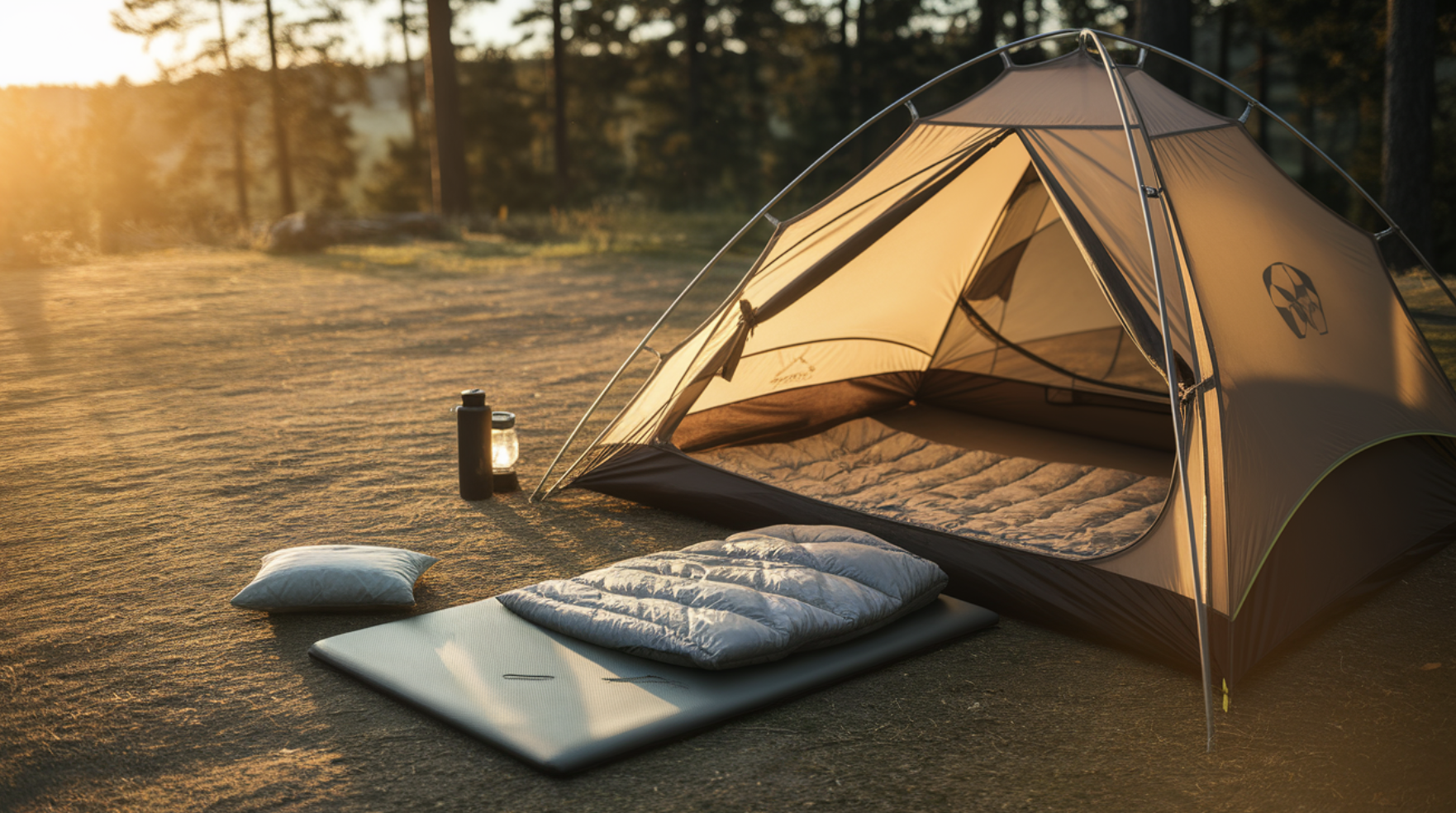
Your home away from home starts with a good tent and sleeping setup. Pick a tent that fits your group with a bit of extra room.
Don’t forget that sleeping on the ground can get cold fast, so a quality sleeping pad makes all the difference between a good night’s rest and tossing and turning until dawn.
| BASIC NEEDS | WHY IT MATTERS |
|---|---|
| Tent with rainfly | Your main protection from the elements |
| Sleeping bag | Choose one rated for the lowest expected temperature |
| Sleeping pad | Creates crucial insulation from the cold ground |
| Pillow | A small luxury that improves sleep quality tremendously |
2. Food & Cooking
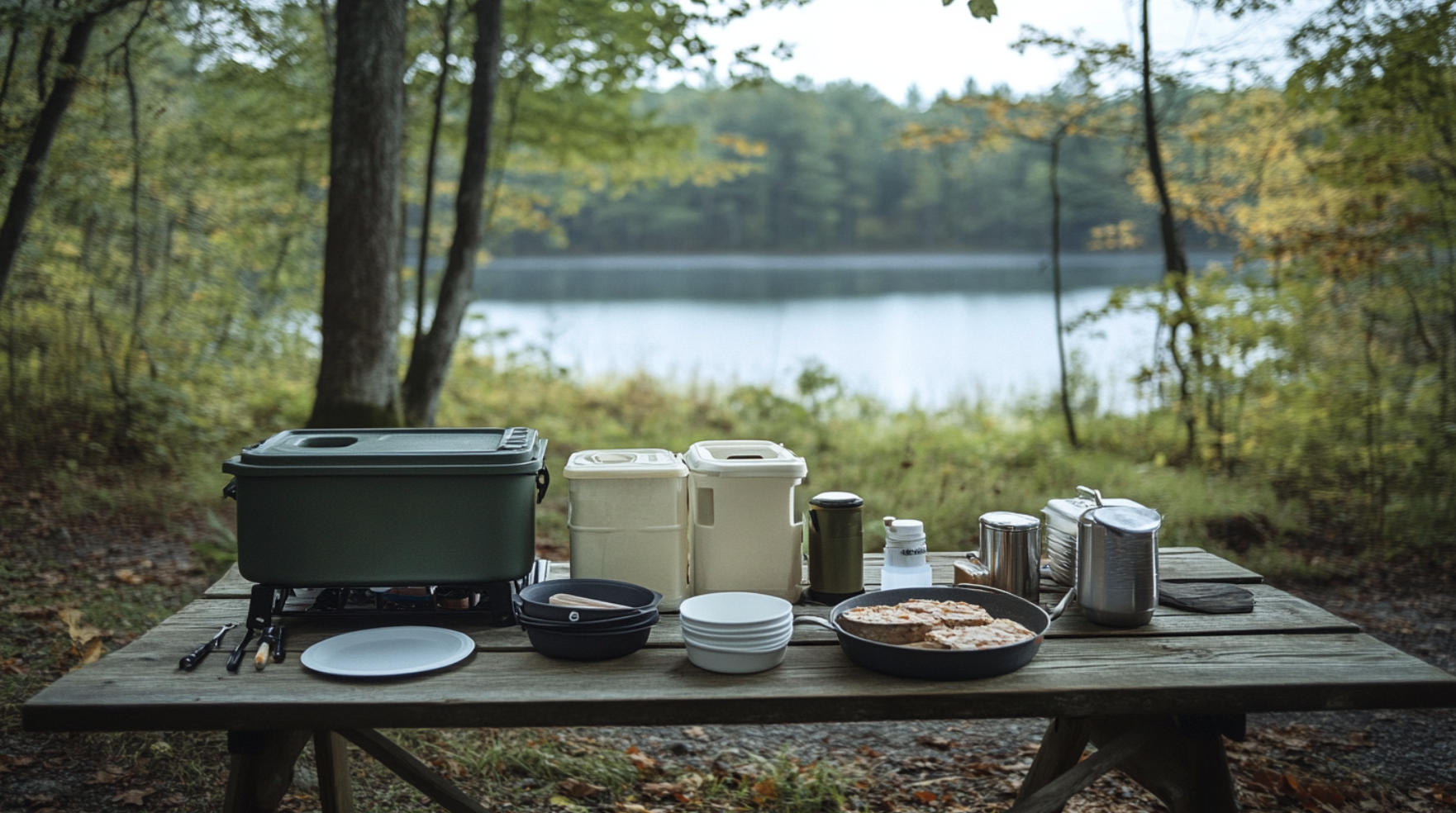
There’s something magical about cooking and eating outdoors. A simple camp stove opens up countless meal options beyond just sandwiches. Pack foods that keep well and bring joy after a long day of hiking or swimming.
The camping kitchen essentials:
- Camp stove and enough fuel for your trip length
- One pot, one pan, and basic utensils
- Plates, cups, and eating utensils for each person
- Water container and method to clean dishes
- Food storage that animals can’t break into
Food planning tip: Prep what you can at home—chop veggies, mix pancake batter, marinate meats—and store in reusable containers. This saves precious camping time and reduces the need for extensive kitchen gear.
3. Light, Tools, & Safety
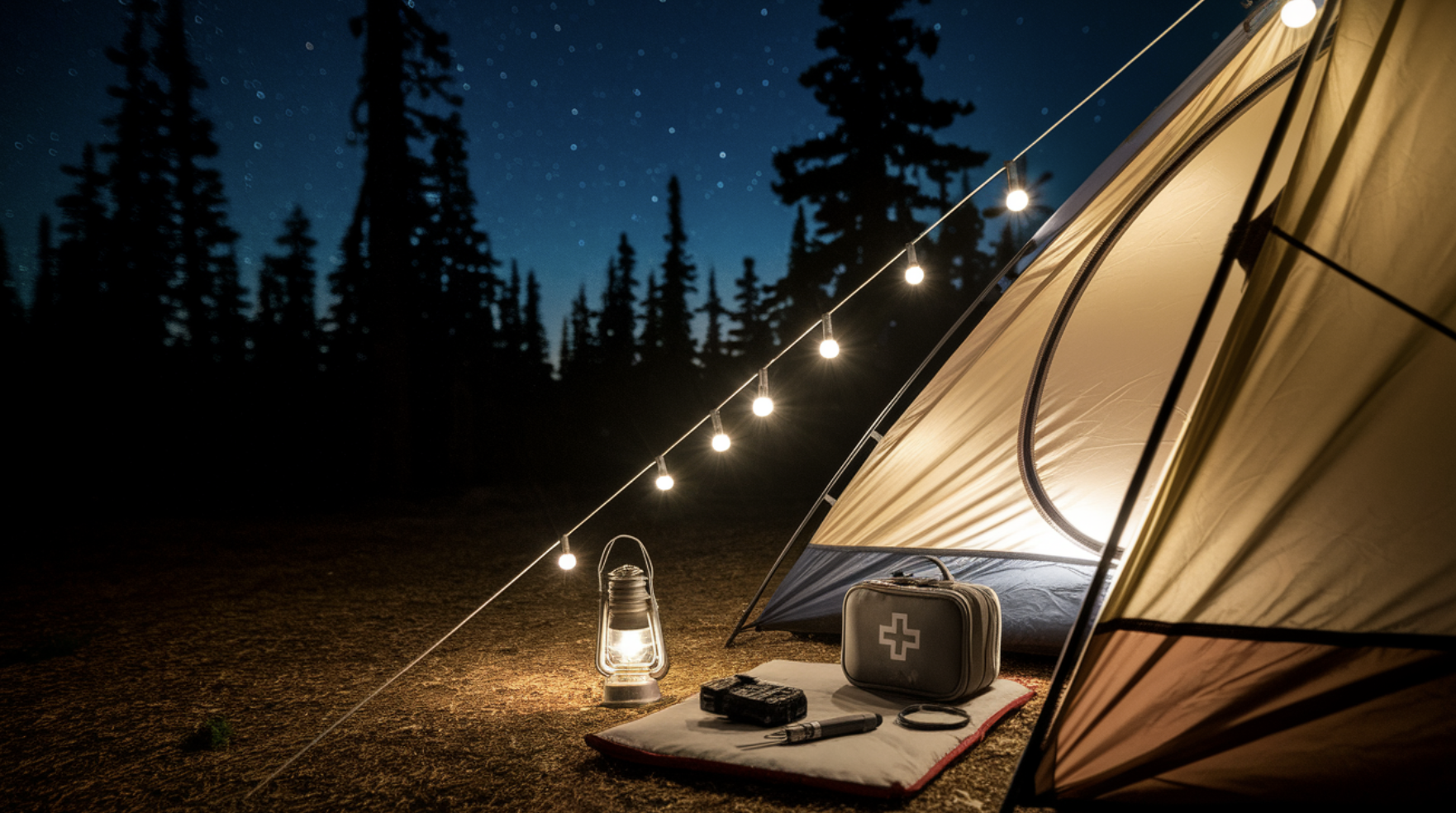
When the sun goes down, camp life changes. Good lighting not only prevents trips and falls but creates a cozy camp atmosphere. Always keep your headlamp in the same pocket of your tent so you can find it quickly in the dark.
A small first-aid kit is non-negotiable, even for short trips. Include basics like bandages, pain relievers, tweezers, and any personal medications. Knowledge is just as important as supplies—know basic first aid and how to get help if needed.
Organizing Gear by Function
Now that we’ve covered the basics, let’s break down your camping gear according to how you’ll use it. Good packing means grouping similar items together for easy access when you need them most.
Think of your camping setup as a well-organized home, with each area serving a specific purpose. From your sleeping quarters to your outdoor kitchen, thoughtful organization saves time and frustration when you’re setting up camp or looking for that one essential item as the sun sets.
Plus, when everything has a place, you’re much less likely to leave important gear behind when packing up!
1. Shelter & Sleep System
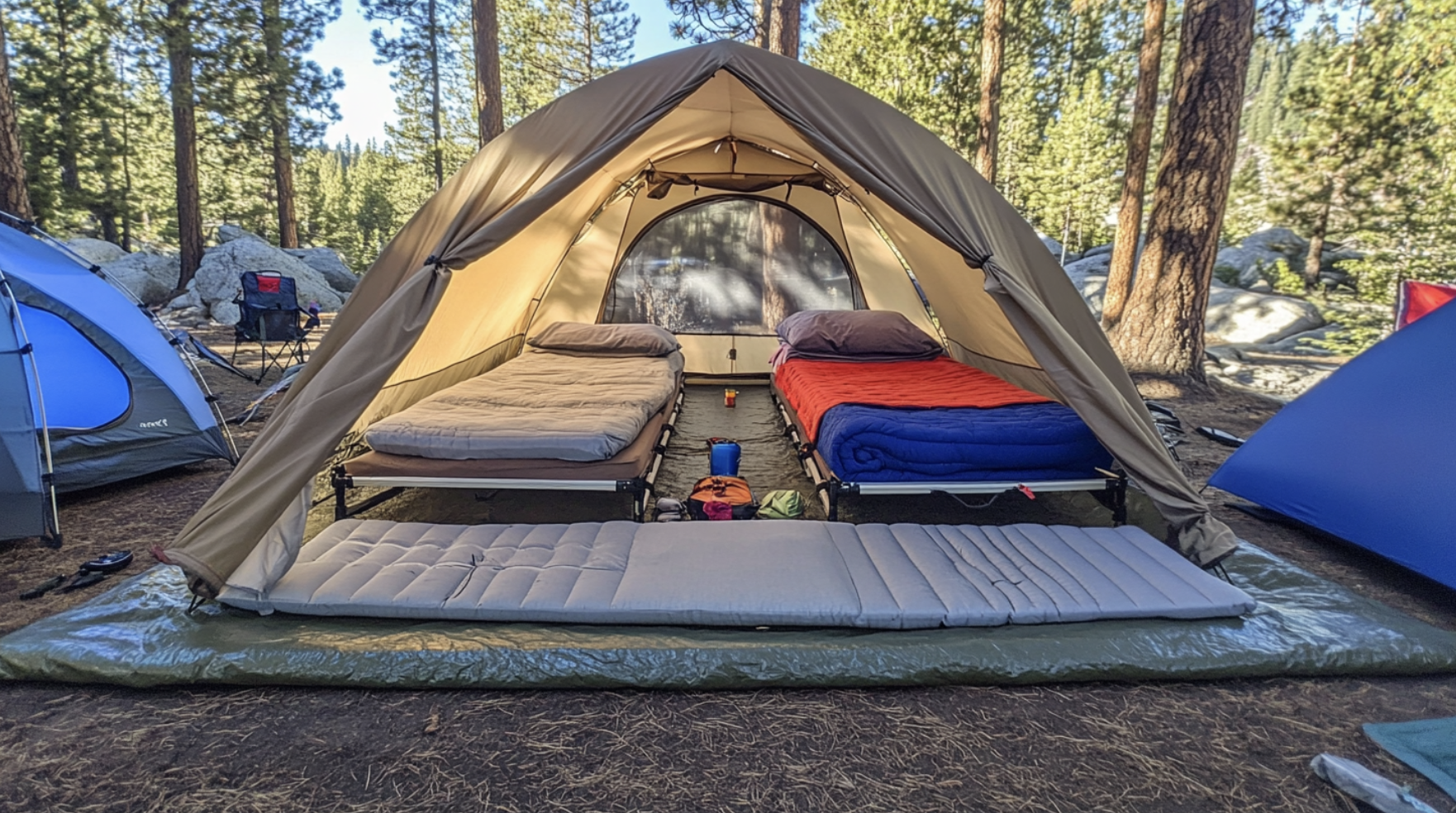
Your tent and sleeping setup are the heart of your camping home. Choose wisely based on your group size and the weather you’ll face.
When picking a tent, consider:
- How many people need to fit comfortably
- What seasons you’ll be camping in
- Weight if you’ll be carrying it far
- Setup time and complexity
Don’t skip the ground cover! A tarp or footprint under your tent stops moisture and protects your tent floor from rocks and sticks.
For sleeping options, weigh the pros and cons: Cots keep you off the ground but take up more space, while pads are light but less cushy than air mattresses.
Hot weather tip: Bring a battery-powered fan and use a lightweight sleeping bag or just a sheet.
2. Kitchen & Food Prep
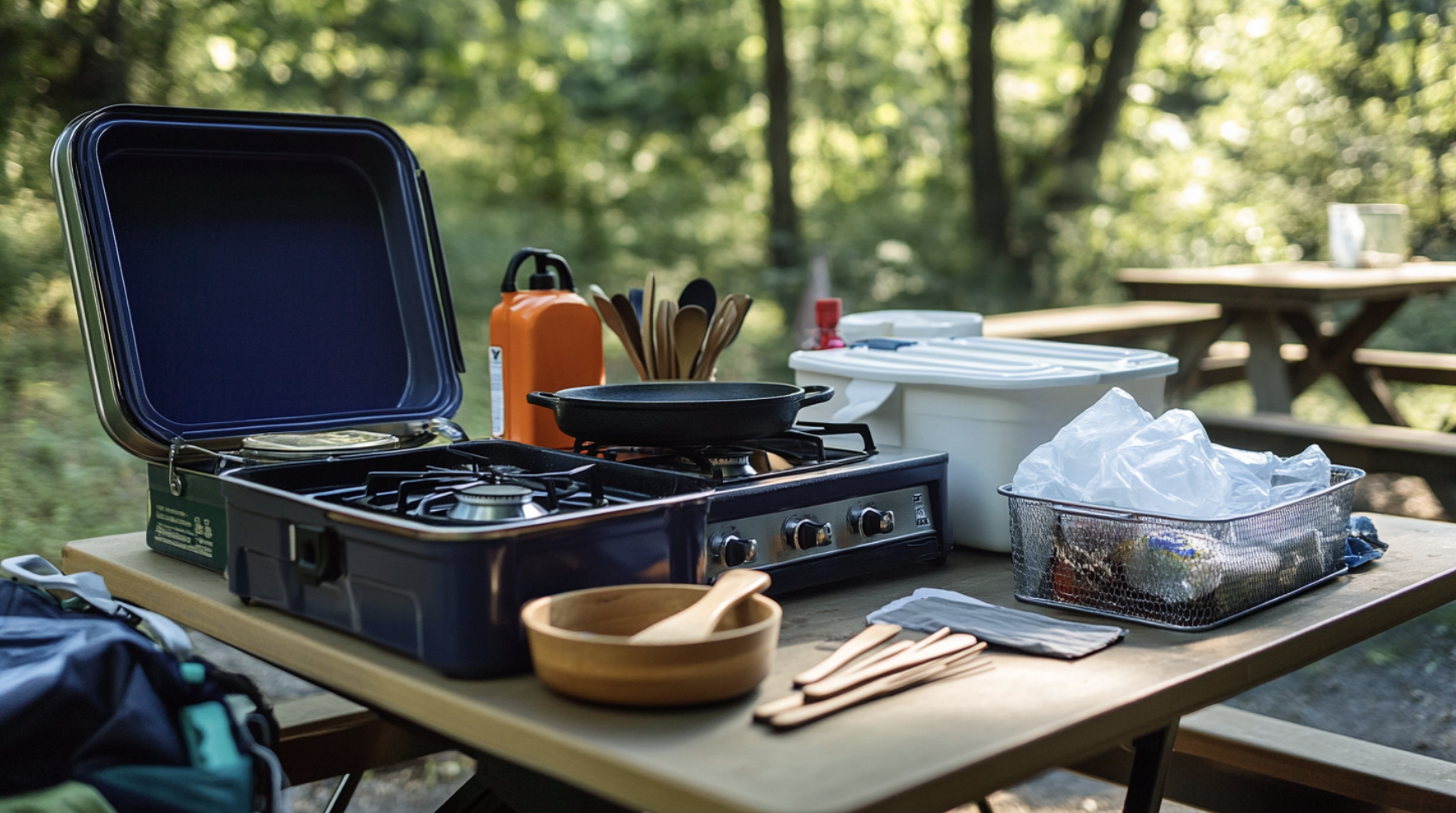
Good food makes camping better! Your outdoor kitchen needs some planning, but it doesn’t have to be complex.
For cooking, consider:
- A two-burner stove for family camping
- Cast iron pan for campfire cooking
- Collapsible bowls and cups to save space
- Wooden spoons that won’t scratch cookware
- Paper towels and trash bags
Cooler know-how: Pre-chill your cooler with ice the night before. Pack in layers with ice on bottom, food in middle, and more ice on top. Keep it in shade and open as little as possible.
For washing dishes, bring two tubs—one for soapy water, one for rinsing—and hang a mesh bag for drying. Pack meals that can be made ahead or cook quickly with minimal cleanup.
3. Clothing & Footwear
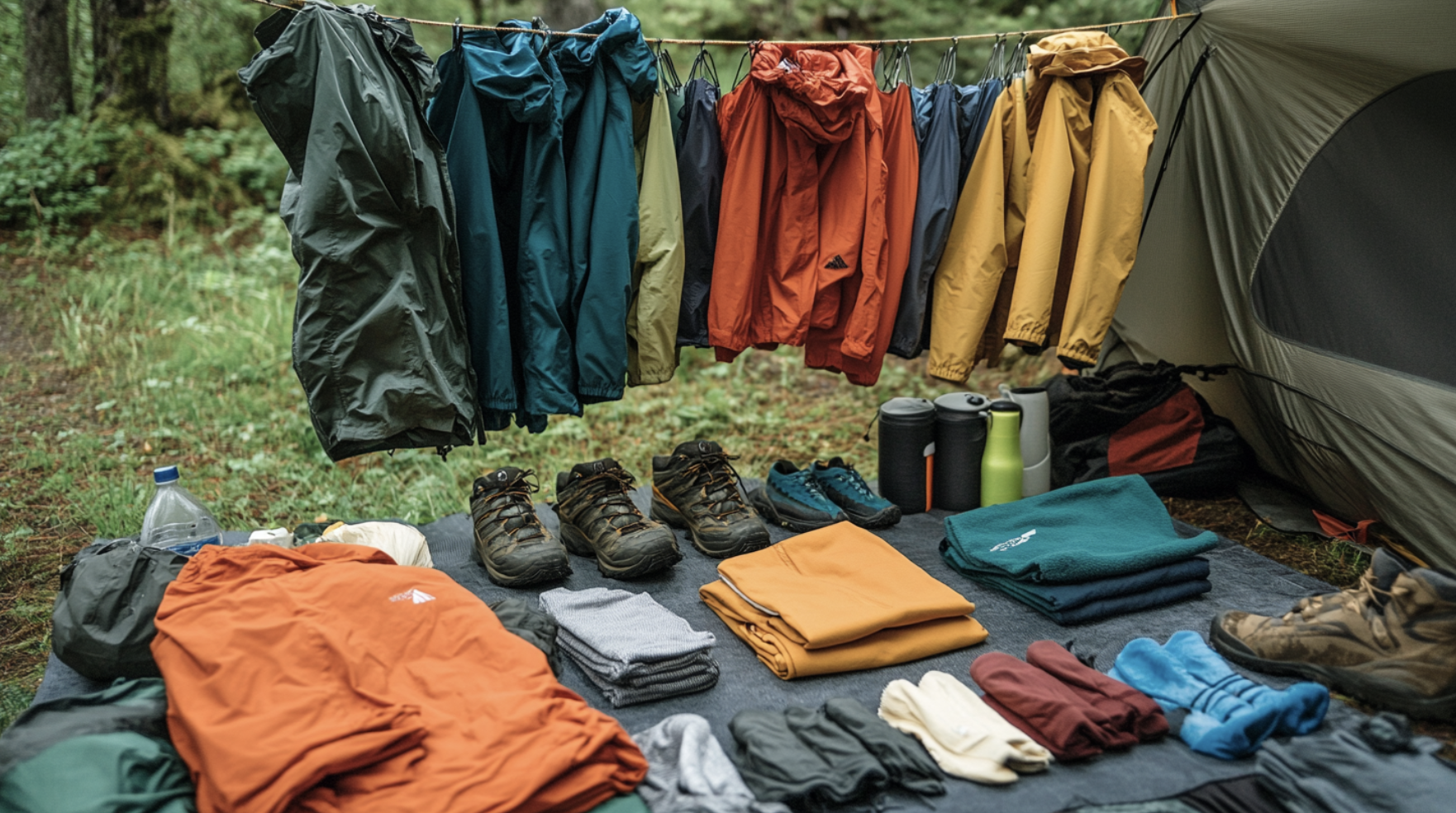
Pack clothes based on what you’ll be doing and the weather forecast, plus extras for unexpected changes.
The key to outdoor comfort is layers:
- Bottom layer: moisture-wicking shirts and underwear
- Middle layer: warm fleece or wool
- Top layer: waterproof jacket and pants
Always pack extra socks! Wet, dirty socks can ruin an otherwise great trip. Bring footwear for different needs: sturdy boots for hiking, water shoes for streams, and slip-ons for around camp.
Store clean clothes in zip bags to keep them dry, and bring a small bag for dirty items.
4. Toiletries & Hygiene
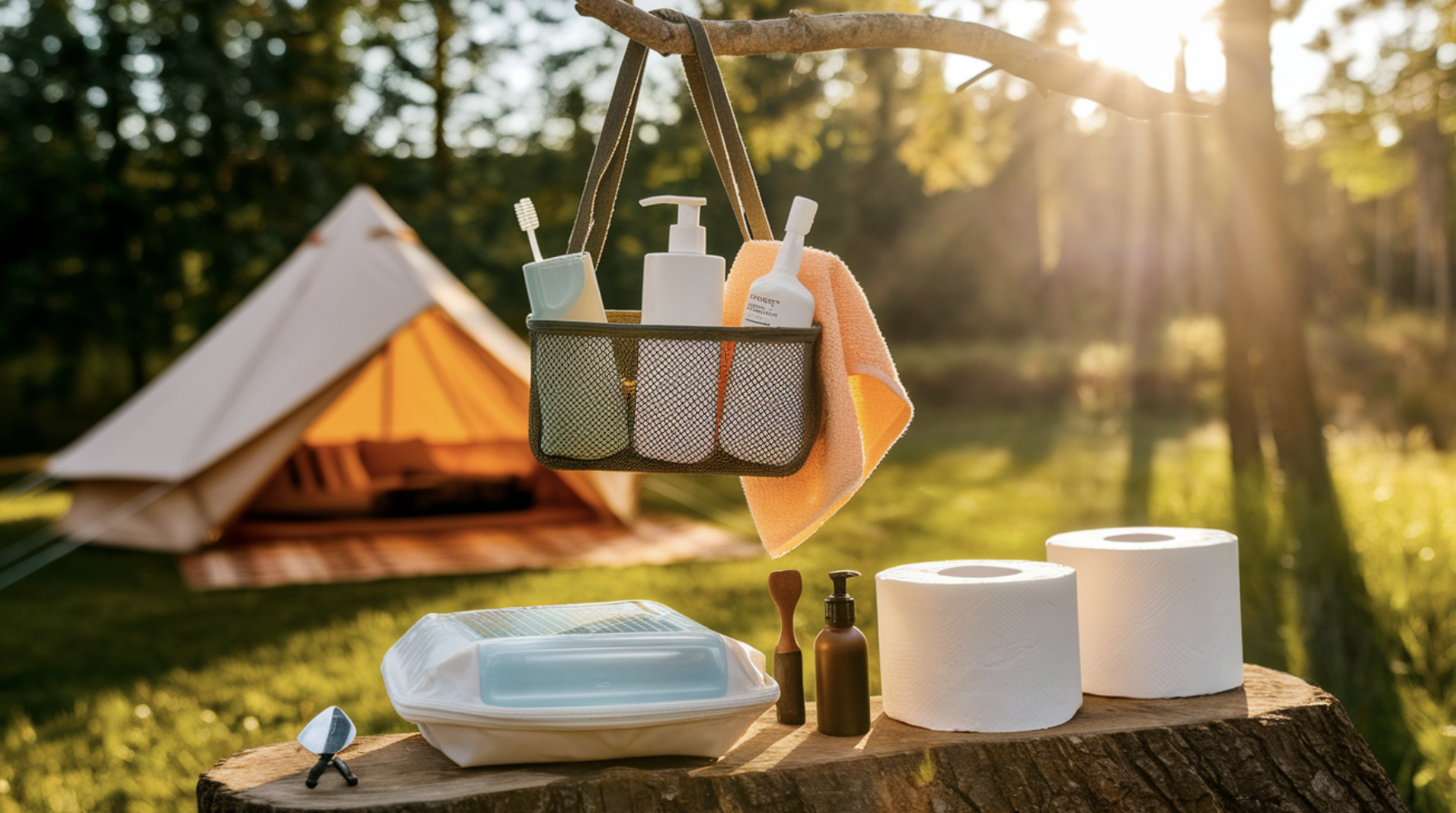
Staying clean makes camping more fun for everyone, even if it’s just a quick wipe-down each day. Basic personal care kit:
- Toothbrush and paste
- Biodegradable soap
- Quick-dry towel (takes up less space than cotton)
- Hand sanitizer
- Wipes for when showers aren’t an option
If showers are available at your campsite, a mesh shower caddy keeps everything handy. For primitive camping, try a solar shower bag or bring extra water for washing.
Remember to check if your campsite has flush toilets, pit toilets, or no facilities at all, and pack accordingly—toilet paper, a small trowel, and bags might be needed.
Comfort, Safety, and Custom Add-Ons
Once you have all the basics covered, it’s time to think about the extras that make camping truly enjoyable and safe. The magic of camping lies in those special touches that turn a simple night outdoors into a memorable stay.
A cozy chair by the fire, games that bring everyone together, or safety items that give you peace of mind—these thoughtful additions transform camping from merely surviving outdoors to truly thriving there.
Your perfect camping setup will grow more personal with each trip as you learn what small luxuries matter most to you! These items aren’t strictly needed, but they can make a big difference in your outdoor experience.
1. Campsite Setup & Extras
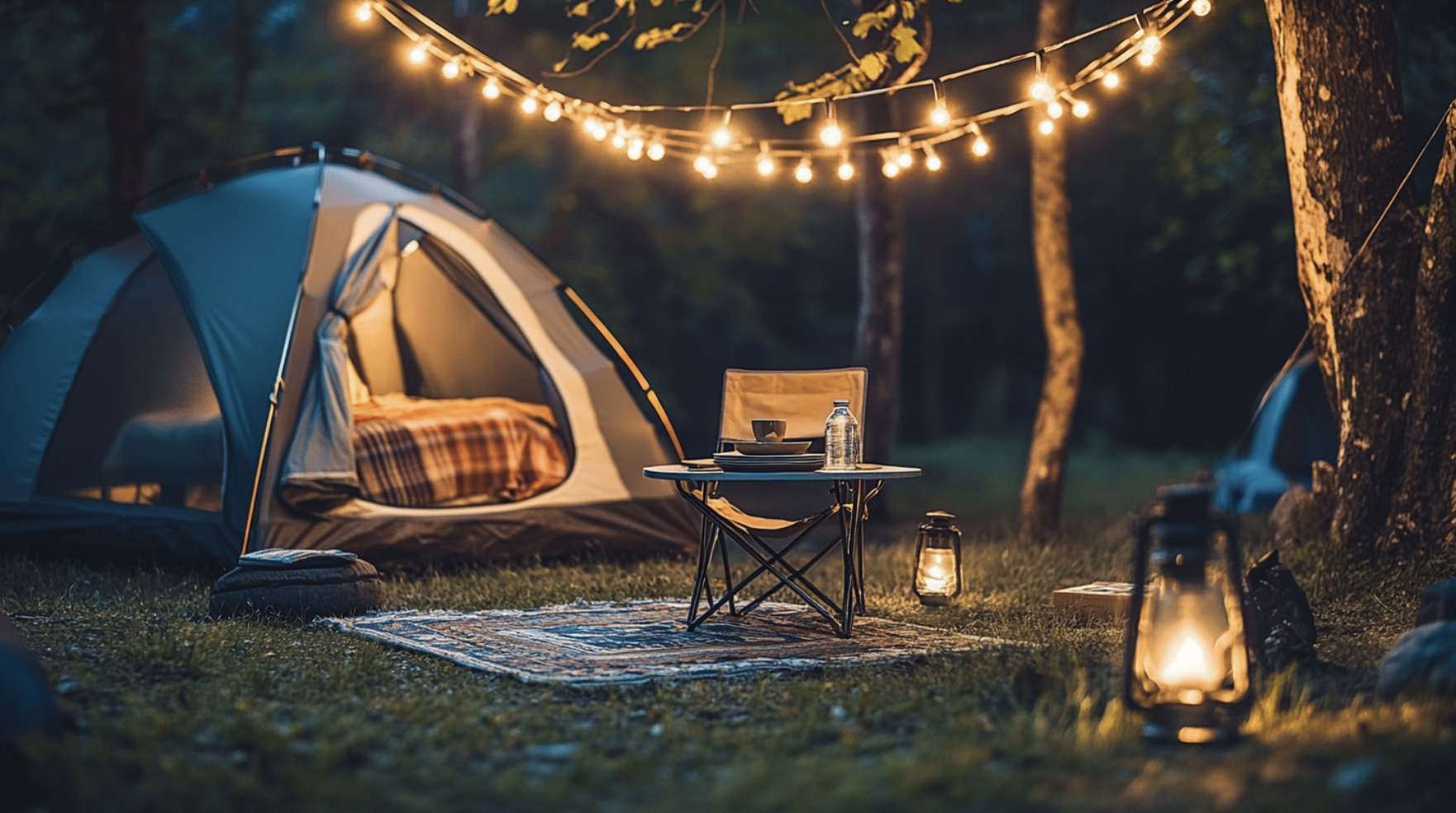
The right setup turns a basic spot into a welcoming outdoor home. Think about what would make your time outside more comfortable.
A good camp chair is worth its weight in gold after a long day of hiking. Add a small folding table for meals and games, and perhaps a shade cover if your site lacks natural shade.
Some campers bring outdoor rugs to place outside their tents—they keep dirt out and add a homey touch.
Evening lighting can be both practical and magical. String lights around your eating area, place solar stake lights to mark paths, or hang a lantern from a tree branch to create a warm glow perfect for nighttime talks.
2. Recreation and Relaxation
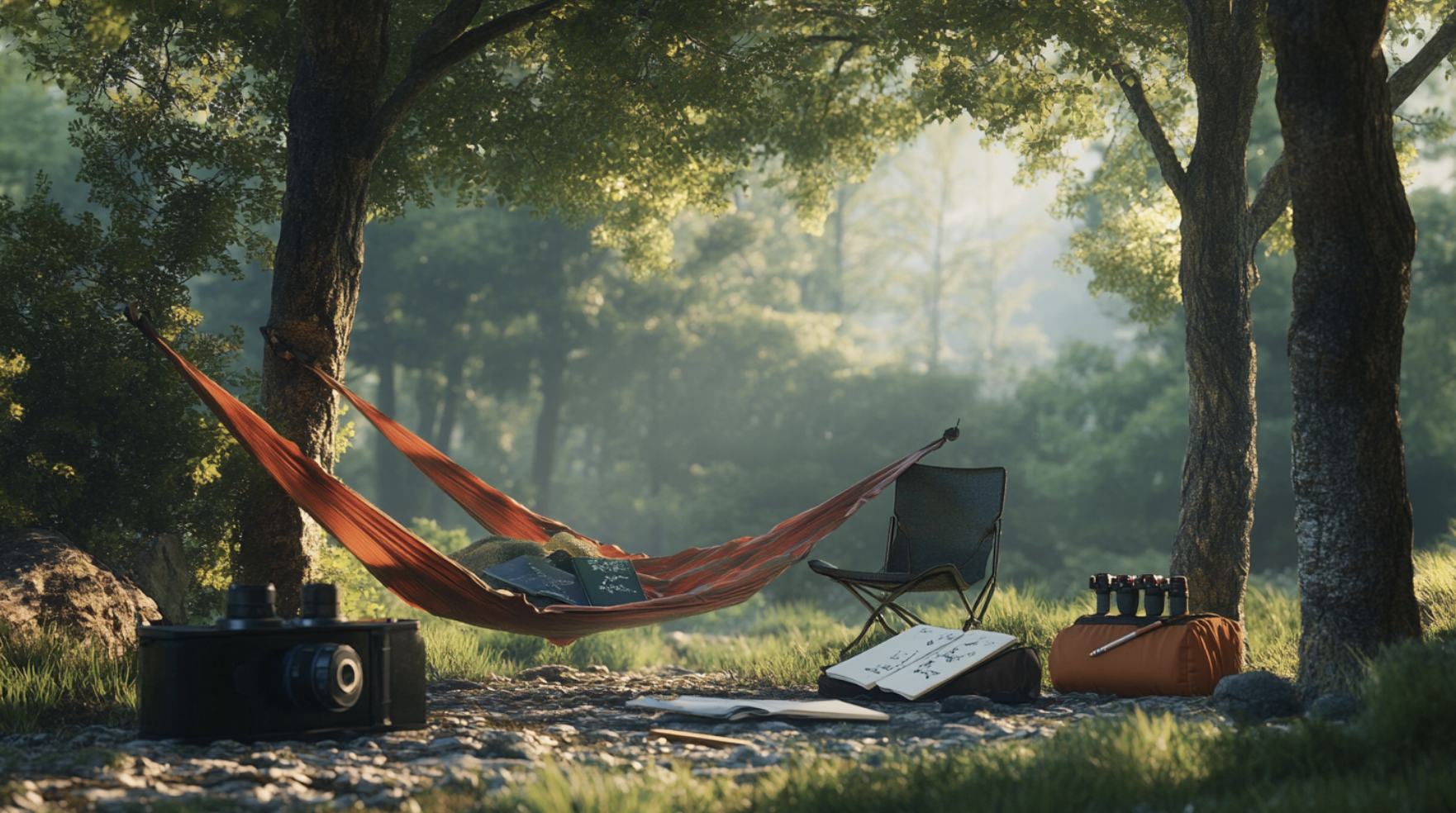
Camping gives you time to play and rest in ways you might not at home. Pack items that help you make the most of this time away.
1. For downtime at camp:
- A deck of cards or small board games
- Books or e-readers
- Notebook and pencil for writing or drawing
- Hammock for afternoon naps
2. For exploring nature:
- Field guides to local plants and animals
- Binoculars for bird watching
- Camera for capturing memories
- Walking sticks for hikes
If bringing kids or pets, plan ahead with special items for them. Kids might need favorite stuffed animals or special snacks, while dogs need their own bed, food bowls, and perhaps a tie-out line.
3. Safety Gear and First Aid
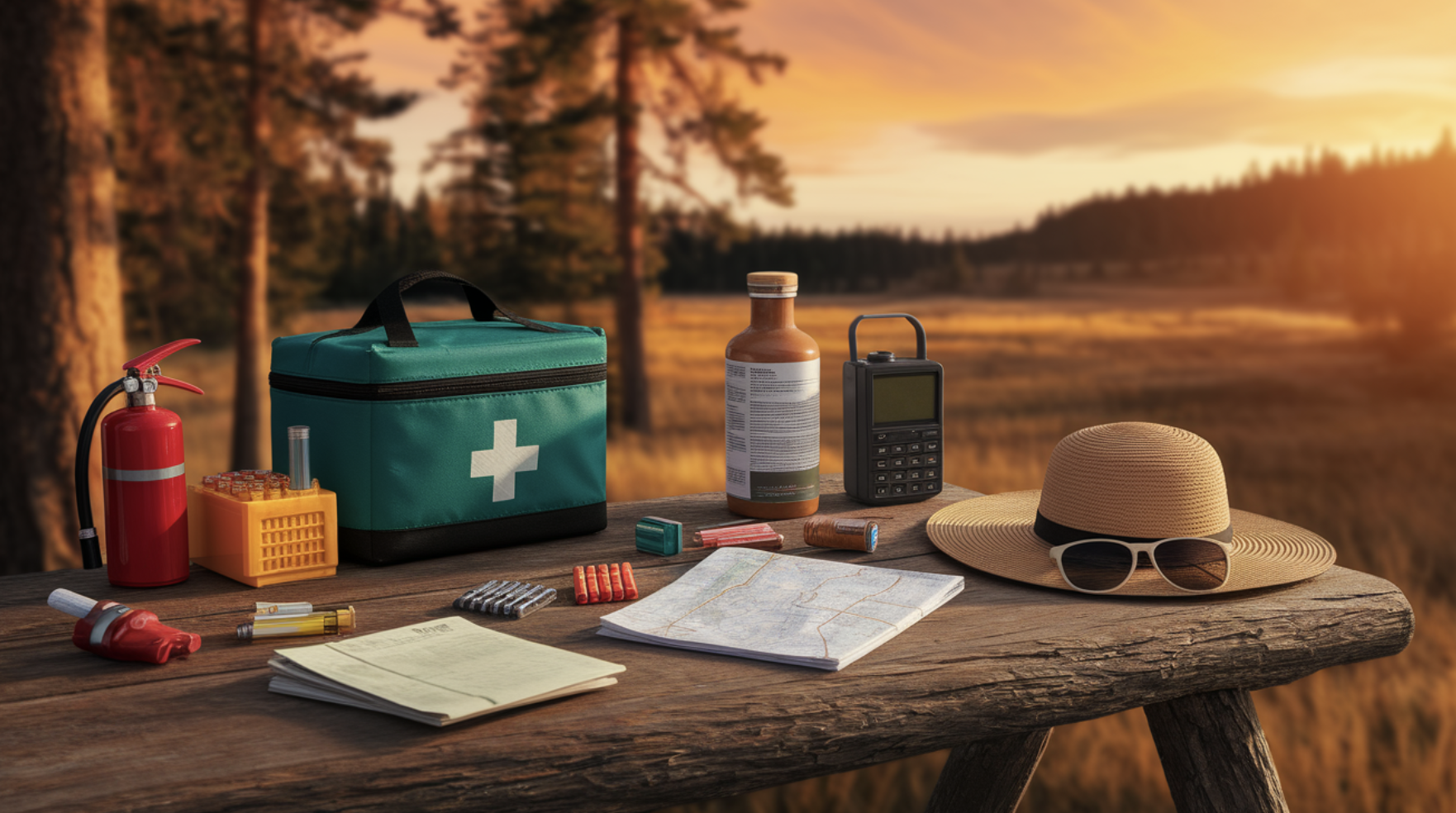
Being ready for problems doesn’t mean expecting them—it just means having peace of mind while you have fun.
Beyond a basic first aid kit, think about:
- A small fire extinguisher
- Extra batteries for all devices
- Maps of the area (paper ones, not just phone)
- Emergency contact information
- Weather radio
For outdoor safety, always pack sun protection (hats, sunscreen, and sunglasses) and bug protection that works for your area. If you’ll be in remote areas, consider a personal locator beacon or satellite messenger.
Know the wildlife in your camping area and take proper precautions—from food storage to watching for snakes on trails.
4. Pack-Up and Post-Trip Musts
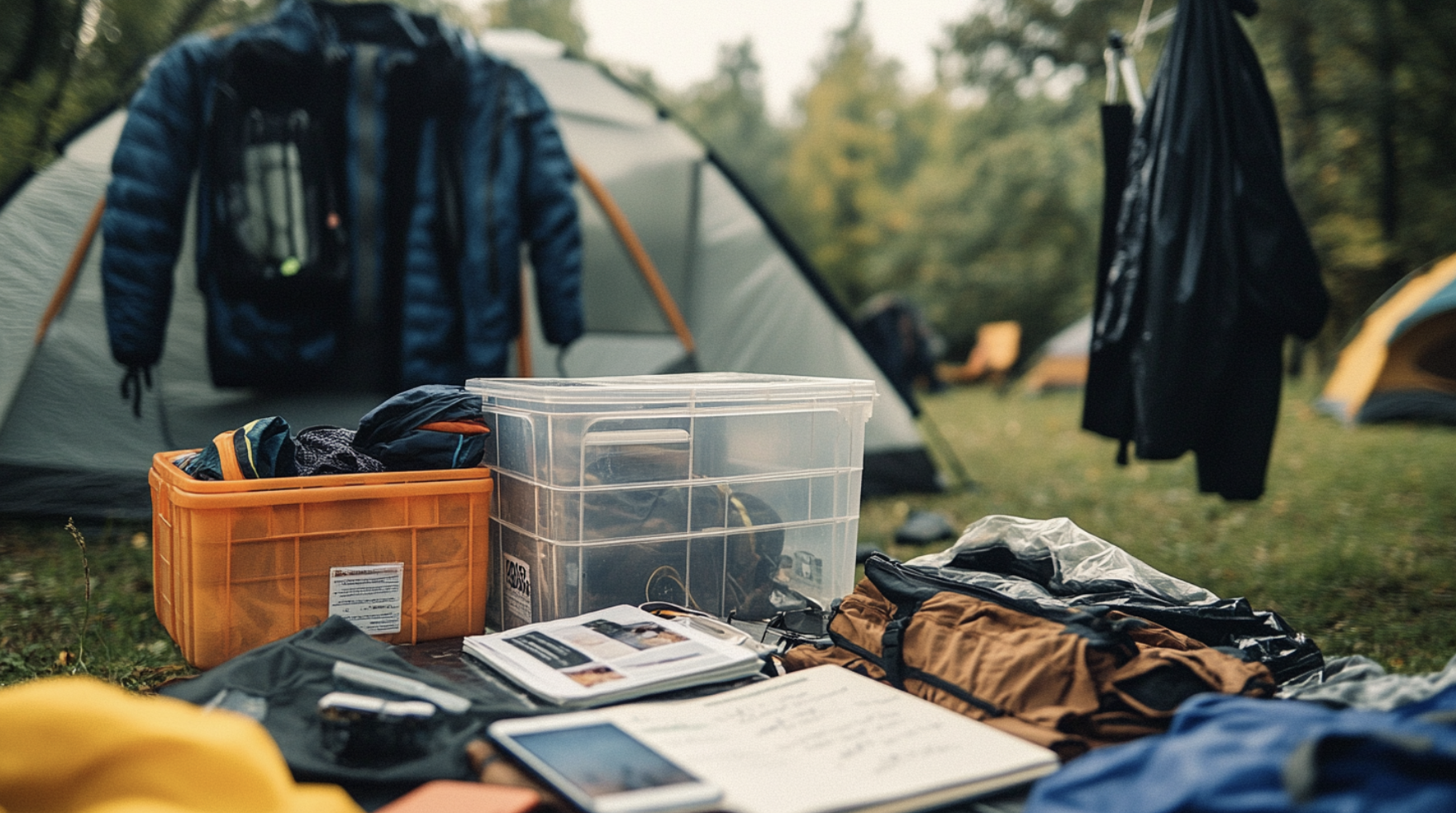
How you end your trip affects your next one. Good habits make future camping trips easier to plan and enjoy.
Before leaving your site, take photos of your setup to remember what worked well. As you pack up, sort items into “keep with camping gear” and “needs washing” piles. Never pack away damp items—this leads to mildew and ruined gear.
At home, hang tents and sleeping bags to fully dry before storing. Make notes about what you used, what you didn’t need, and what you wished you’d brought. Keep a master checklist updated for next time.
Store your gear in clear bins by category (kitchen, sleep, tools) so you can quickly find what you need for your next outdoor trip.
That’s a Wrap!
The perfect camping trip starts long before you pitch your tent. Smart packing means balancing essentials with space limitations—bringing what you need without hauling your entire home into the woods.
Keep this packing list handy as you prepare, and soon you’ll develop your own system that works trip after trip. The best part about camping? Each outdoor stay teaches you something new about what you truly need (and what you don’t).
Pack thoughtfully, travel light when possible, and remember: the whole point is to step away from daily life and enjoy simple pleasures. Happy camping!
Check back soon for more destination spotlights, packing advice, and outdoor travel ideas.
